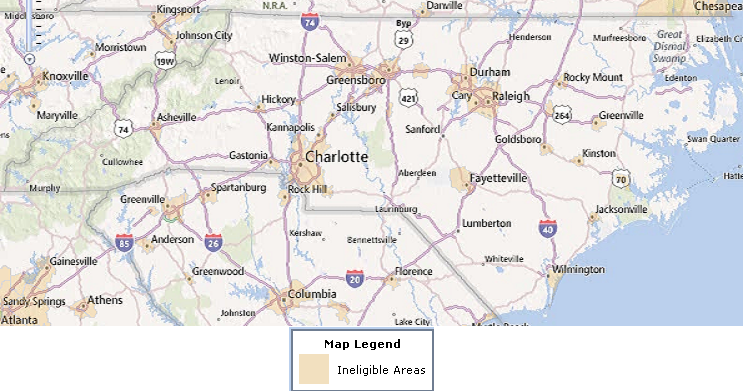 USDA Rural Housing is a Government backed home loan offered throughout North Carolina in designated eligible locations. One of the great benefits of a USDA Rural Development mortgage is that it offers 100% financing. This means that qualified buyers can purchase a home with no down payment required.
USDA Rural Housing is a Government backed home loan offered throughout North Carolina in designated eligible locations. One of the great benefits of a USDA Rural Development mortgage is that it offers 100% financing. This means that qualified buyers can purchase a home with no down payment required.
But what exactly is a USDA loan? It is a government-backed program designed to help low- to moderate -income individuals and families in designated rural areas achieve homeownership. The program is administered by the U.S. Department of Agriculture (USDA) through approved lenders and banks and offers affordable mortgage options to eligible home buyers.
North Carolina USDA Loan Eligibility:
To be eligible for a USDA Rural Housing loan, you must meet certain household income and location requirements. Your annual household income cannot exceed the moderate-income limit for your area, which is determined by the USDA based on family size and county location. In most counties in North Carolina, the income limits start at $110,650 for a household of 1–4 members in 2024. This income limit is even higher for larger families with 5+ members in the household. Charlotte and Raleigh MSA income limits are slightly higher. Please see the complete chart below.
Additionally, the property you are looking to purchase must be located in an eligible rural area as defined by the USDA. But don’t let the term “rural” fool you. Many suburban and areas outside of cities like Charlotte, Raleigh, Greensboro, Winston-Salem, Durham may have approved areas. In fact, nearly 97% of the United States is still eligible.
North Carolina USDA Mortgage Benefits:
- One of the major benefits of a USDA mortgage is the ability to finance 100% of the home’s purchase price with no down payment required. This can make homeownership more attainable for those who may not have the funds for a large down payment.
- Another benefit is the low-fixed interest rates offered by USDA loans. These rates are often lower than conventional loans, making them an attractive option for budget-conscious borrowers. In addition, there is reduced monthly mortgage insurance when compared to FHA loans.
- USDA are not limited to just first-time home buyers. Anyone can apply for a USDA loan as long as they meet the income and credit requirements.
- USDA loans do not have set loan limits, borrowers qualify based on their debt-to-income ratios.
- USDA loans have flexible credit guidelines. Borrowers with less-than-perfect credit may still be able to qualify for a USDA loan, making it a great option for those who are working on rebuilding their credit.
- USDA loans also offer competitive closing costs and fees. The USDA guarantees these loans through approved lenders, which can help borrowers secure more favorable terms and conditions.
- In addition to these benefits, there are specific advantages for homeowners in North Carolina. This state has many rural areas that are eligible for USDA financing, allowing residents to take advantage of the program’s benefits.
USDA Loan Restrictions:
- There are a few key factors to keep in mind when considering a USDA mortgage in North Carolina. First and foremost, this loan program is only available for primary residences, not investment properties or second homes.
- There are credit score and debt-to-income ratio requirements that must be met in order to qualify for a USDA mortgage. However, these requirements may be more lenient compared to other traditional loans.
- USDA mortgages also have geographic restrictions as stated above and are designed for only eligible locations. This means that the property being purchased must be located in a designated eligible area according to the USDA map here. *Note, the map link is a great tool and allows buyers to search for individual property address
The USDA application process is simple and often takes minutes to complete. Buyers can learn more or get started by calling the number above 7 days a week, or just submit the Info Request Form on this page.
Household Size > 1-4 5-8
| Alleghany County, NC | $110,650 | $146,050 |
| Anson County, NC | $110,650 | $146,050 |
| Ashe County, NC | $110,650 | $146,050 |
| Asheville, NC | $110,650 | $146,050 |
| Avery County, NC | $110,650 | $146,050 |
| Beaufort County, NC | $110,650 | $146,050 |
| Bertie County, NC | $110,650 | $146,050 |
| Bladen County, NC | $110,650 | $146,050 |
| Brunswick County, NC | $110,650 | $146,050 |
| Burlington, NC MSA | $110,650 | $146,050 |
| Camden County, NC | $110,650 | $146,050 |
| Carteret County, NC | $110,650 | $146,050 |
| Caswell County, NC | $110,650 | $146,050 |
| Charlotte-Concord-Gastonia, NC | $114,650 | $151,350 |
| Cherokee County, NC | $110,650 | $146,050 |
| Chowan County, NC | $110,650 | $146,050 |
| Clay County, NC | $110,650 | $146,050 |
| Cleveland County, NC | $110,650 | $146,050 |
| Columbus County, NC | $110,650 | $146,050 |
| Craven County, NC | $110,650 | $146,050 |
| Dare County, NC | $110,650 | $146,050 |
| Davidson County, NC | $110,650 | $146,050 |
| Duplin County, NC | $110,650 | $146,050 |
| Durham-Chapel Hill, NC | $116,300 | $153,500 |
| Fayetteville, NC | $110,650 | $146,050 |
| Gates County, NC | $110,650 | $146,050 |
| Goldsboro, NC MSA | $110,650 | $146,050 |
| Graham County, NC | $110,650 | $146,050 |
| Granville County, NC | $110,650 | $146,050 |
| Greene County, NC | $110,650 | $146,050 |
| Greensboro-High Point, NC | $110,650 | $146,050 |
| Greenville, NC MSA | $110,650 | $146,050 |
| Halifax County, NC | $110,650 | $146,050 |
| Harnett County, NC | $110,650 | $146,050 |
| Haywood County, NC | $110,650 | $146,050 |
| Hertford County, NC | $110,650 | $146,050 |
| Hickory-Lenoir-Morganton, NC | $110,650 | $146,050 |
| Hoke County, NC | $110,650 | $146,050 |
| Hyde County, NC | $110,650 | $146,050 |
| Iredell County, NC | $110,650 | $146,050 |
| Jackson County, NC | $110,650 | $146,050 |
| Jacksonville, NC MSA | $110,650 | $146,050 |
| Jones County, NC | $110,650 | $146,050 |
| Lee County, NC | $110,650 | $146,050 |
| Lenoir County, NC | $110,650 | $146,050 |
| Lincoln County, NC | $110,650 | $146,050 |
| Macon County, NC | $110,650 | $146,050 |
| Martin County, NC | $110,650 | $146,050 |
| McDowell County, NC | $110,650 | $146,050 |
| Mitchell County, NC | $110,650 | $146,050 |
| Montgomery County, NC | $110,650 | $146,050 |
| Moore County, NC | $110,650 | $146,050 |
| Northampton County, NC | $110,650 | $146,050 |
| Pamlico County, NC | $110,650 | $146,050 |
| Pasquotank County, NC | $110,650 | $146,050 |
| Pender County, NC | $110,650 | $146,050 |
| Perquimans County, NC | $110,650 | $146,050 |
| Person County, NC | $110,650 | $146,050 |
| Polk County, NC | $110,650 | $146,050 |
| Raleigh, NC MSA | $130,300 | $172,000 |
| Richmond County, NC | $110,650 | $146,050 |
| Robeson County, NC | $110,650 | $146,050 |
| Rockingham County, | $110,650 | $146,050 |
| Rocky Mount, NC MSA | $110,650 | $146,050 |
| Rowan County, NC | $110,650 | $146,050 |
| Rutherford County, NC | $110,650 | $146,050 |
| Sampson County, NC | $110,650 | $146,050 |
| Scotland County, NC | $110,650 | $146,050 |
| Stanly County, NC | $110,650 | $146,050 |
| Surry County, NC | $110,650 | $146,050 |
| Swain County, NC | $110,650 | $146,050 |
| Transylvania County, NC | $110,650 | $146,050 |
| Tyrrell County, NC | $110,650 | $146,050 |
| Vance County, NC | $110,650 | $146,050 |
| Virginia Beach-Norfolk-Newport News | $113,850 | $150,300 |
| Warren County, NC | $110,650 | $146,050 |
| Washington County, NC | $110,650 | $146,050 |
| Watauga County, NC | $110,650 | $146,050 |
| Wilkes County, NC | $110,650 | $146,050 |
| Wilmington, NC | $110,650 | $146,050 |
| Wilson County, NC | $110,650 | $146,050 |
| Winston-Salem, NC | $110,650 | $146,050 |
| Yancey County, NC | $110,650 | $146,050 |


